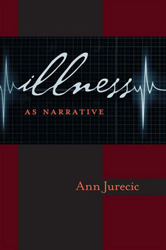Ann Jurecic believes genre allows us to explore meanings of human fragility, mortality

Yet as Illness as Narrative (University of Pittsburgh Press 2012) by Rutgers University Associate Professor Ann Jurecic shows, though illness memoirs have become increasingly popular, literary critics have often dismissed them as overly sentimental and self-indulgent. At the same time, however, illness narratives have drawn praise from medical educators who believe they have a therapeutic value for patients and a pedagogical benefit for students.
Jurecic, who has taught courses on literature and medicine, reexamines the illness narrative as a genre that rose to prominence during the AIDS epidemic of the 1980s. .
"These texts invite readers to pay attention to the complex ways that writing and reading sustain individuals, communities and cultures," she says. "Literary narratives about illness, both fiction and nonfiction, allow us to explore the complex meanings of human fragility and mortality."
Illness narratives grew increasingly popular after the AIDS crisis of the 1980s, when people diagnosed with the disease began publishing a wide range of writing about their experiences. The genre also emerged because of transformations in the medical profession.
"Medicine became a big business," says Jurecic, a faculty member in the Department of English in the

The Internet is also contributing to the proliferation of illness narratives, Jurecic notes. Instead of documenting their illnesses in books, people are now writing blogs and commenting on discussion boards about their struggles with diseases and disabilities.
"The Internet has made possible the telling and preservation of personal stories in a way that wasn't possible more than 10 years ago," Jurecic says. "When you start exploring online, you realize that there's an ocean of these narratives out there."
In response to this profusion of writing about disability and disease, Jurecic believes some literary critics are beginning to temper their suspicion of these narratives and recognize how they address readers' concerns. "Critics need to understand that people tell these stories to make meaning of their lives and to find ways to acknowledge that they are not going to live forever," she says.
Rachel Hadas, the Board of Governors Professor of English of Rutgers-Newark, says Illness as Narrative is the first book to place illness memoirs in a historical and critical perspective. The author of numerous books of poetry, essays and translations, Hadas agrees that there has been a disconnect between the growth of medical narratives and the ways that literary critics have traditionally viewed literature.
"The premise of her book is that this kind of writing needs to be acknowledged and it needs to be understood and put in some kind of context," says Hadas, who has written an illness narrative herself called Strange Relation: A Memoir of Marriage, Dementia, and Poetry (Paul Dry Books 2011) about her husband's early-onset dementia.
In addition to her courses at the Rutgers’ Newark Campus, Hadas is also teaching poetry this spring to first-year medical students at Columbia University's College of Physicians and Surgeons. "The theory is that it will make them better communicators and more empathetic," she says."Ann's book is brilliant in examining these assumptions."
In her book, Jurecic explains that while teachers in the medical humanities believe that exposing students to literature will make them more empathic and more effective in treating patients, there is no strong evidence yet supporting that connection.
"I understand the hope that reading and discussing literature and illness narratives will make students better doctors," Jurecic says. "But literature isn't a simple panacea for all that ails the practice of medicine. The question is whether we — doctors, students or any of us — are willing to make the time to connect the complex insights of literature to our everyday lives. Illness narratives tell us that making that time is urgent."